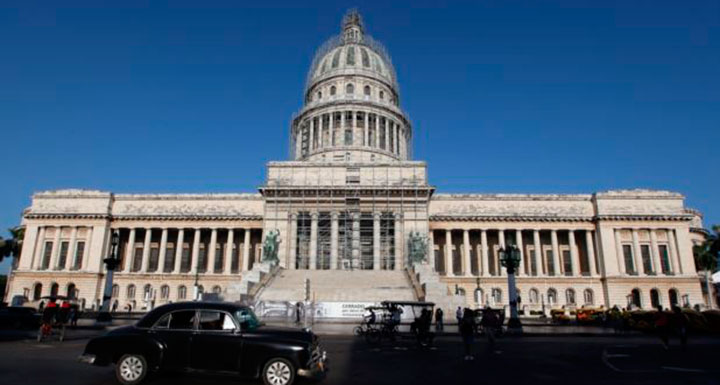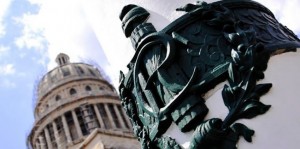
The Capitol, the sovereign, representation and the law
HAVANA – A few days ago, Progreso Semanal published an article titled “By the time the Capitol is finished…” that stated that the Capitol building, at present undergoing a general restoration, would again be the seat of Cuba’s Parliament, which would occupy the first floor and the North wing of the third and fourth floors.
The materialization of that idea could bring political changes to Cuba that transcend a simple move of the National Assembly of the People’s Power from its current location at the corner of 42nd and 23rd streets in the Havana municipality of Playa.
It should be made clear, however, that that’s the location of the Assembly’s offices only. The few times that the Assembly holds its sessions during the year — ordinary and special, with more than 600 deputies — it does so in the Palace of Conventions.
 The move, whether imminent or delayed (this will depend above all on the construction project, which is running into obstacles), raises questions about the structure and functions of that organ of representation of our political system.
The move, whether imminent or delayed (this will depend above all on the construction project, which is running into obstacles), raises questions about the structure and functions of that organ of representation of our political system.
Do clothes make the man? The Capitol was originally built to house a Parliament that was different from today’s. Will the change in site bring a renovation in aspects that have been in the public agenda for a while now?
The first issue is related to the few sessions. According to the Cuban Constitution, the National Assembly must meet twice a year in ordinary session. This traditionally happens in mid-year and at year’s end. It can meet in special session as many times as are necessary, after being convened by the Council of State, something that happens almost always once a year.
When the Assembly is not in session, in its stead (though not at the same level) the sessions are held by the Council of State, a body that represents the Assembly. It has 31 members, who are not elected by popular vote but by direct election by the citizens.
They first enter Parliament as deputies and the newly formed Parliament elects — from all the deputies — the members of the Council of State, as well as the Council’s leadership.
A second issue is involved here: the weight the Council of State has in Cuba’s legislative activity when it has regulated essential questions of Cuban society through decrees/laws that could or should have been regulated through legislation, taking into account the political-legal meaning of the laws, and despite the equivalence that the National Assembly established in 1979 between these two juridical bodies with different rank.
A third issue has to do with the dynamics of the sessions. In particular, with the marked tendency to vote unanimously on various bills as a manifestation of a likely monolithic thought (with little dissent from its members) which, in principle, has nothing to do with a single-party system.
It is said that the likely discussions occur during the prior committee meetings, but during the plenary sessions what the people see in the televised broadcasts — edited and delayed — is usually an exercise in practically unanimous approval.
The fourth issue has to do with the questionable efficacy of one of the essential features of the Cuban Parliament: its representativeness. Parliament represents the different strata of Cuban society, so laborers, farmers, military personnel, athletes, clerics, intellectuals, and artists may gain seats as deputies.
Our deputies are not technocrats, they don’t make a living from politics, and the Constitution states clearly that their status does not carry privileges or economic benefit whatsoever, and that, while they represent the people, they keep the jobs they had before being elected to the Assembly and are paid their regular salary.
But, to what degree do hyper-representativeness and the deputies’ lack of specialization in political management (which everybody knows is an art) condition Cuba’s legislative activity?
Bearing in mind these issues, a change of venue by the Cuban Parliament would “actualize” (the established nomenclature) the Constitutional mandate that “the National Assembly of the People’s Power is the supreme organ of power of the State. It represents and expresses the sovereign will of all the people,” as the only body with legislative power in the republic.
That would happen by a simple fact: relocating the Cuban Parliament in the first floor and the North wing of the third and fourth floors of the Capitol would necessarily (?) mean slashing its membership by more than half.
Before 1959, the Cuban Congress held sessions in the Capitol with 54 senators and 100 or more members of the House of Representatives, depending on the political juncture. At present, we might envision a National Assembly reduced to 280 deputies.
This could positively influence the logic of the representation/people’s mandate in which this important body of state decision-making must move.
Representativeness would not be sacrificed but “perfected” by having deputies with greater knowledge of politics — which doesn’t necessarily mean political culture, another issue altogether.
Nevertheless, the question remains whether the deputies who will gather at the Capitol would be political workers or people with dissimilar jobs who think about politics and debate it.
I would prefer the first option, because that way nothing could prevent the new National Assembly from being in permanent session all year long. Besides, it would contribute even more “to the freedom of discussion, the exercise of criticism and self-criticism, and the subordination of the minority to the majority” (another Constitutional mandate) that would replace sterile speeches, revolutionary (?) reaffirmation, and unanimity.
In the case of the second option, the new Assembly could hold quarterly sessions with a duly planned legislative agenda. In both options, the sovereign, i.e., the people, will continue to directly elect those who have to represent their interests, drafting bills that, because of their regulative hierarchy (according to the Constitution), will again regulate all the essential questions of Cuban society.
Finally, the idea that the North wing will have facilities for television, editing rooms for video, and connections for remote broadcasts — as Progreso Semanal reported — leads me to believe that the National Assembly sessions will be broadcast in their entirety, for popular viewing and the greater development of the political culture of our people, who will be able to say, “this is how our deputies work.”
Beyond the speculations, other questions remain, just as transcendental. For example, whether a reduced, specialized and permanent Parliament could lead to a rethinking of the functions of the Council of State, or if the deputies in the new National Assembly could be unseated directly by the people.
Even more important is whether it’s necessary to finish the renovation of the Capitol building (“the day that snows falls in Havana”) to undertake these transformations in the highest body of the People’s Power.
Well, anyway, let’s hope that the Parliament’s change of venue to the Capitol will occur as soon as possible and that it will help to activate other political dynamics in the body that — in the name of the people’s sovereignty — is the incarnation of the Cuban people.
*The author holds a doctorate in Juridical Sciences; he is a professor at the University of Havana’s School of Law.

